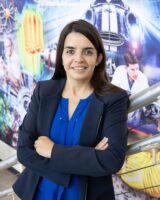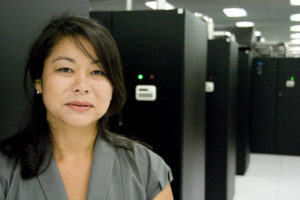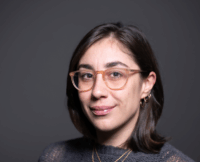–
9:00 am - 5:00 pm
701 Convention Plaza, Suite 300
St. Louis, MO, 63101
United States

23rd international WHPC workshop: Building Community, Building Careers
The 23rd international Women in HPC workshop will be held at SC25 with the goal of fostering a diverse and inclusive HPC community. The WHPC workshop aims to raise awareness and address issues around diversity and inclusion within the HPC community and workforce. Traditionally, our workshop series has focused on gender diversity and issues primarily facing women. Since the workshop at SC23, we have had an increased emphasis on diversity and inclusion of all people from under represented groups. By explicitly broadening our scope, we hope to increase participation from other minority groups and particularly those individuals who feel marginalized across multiple dimensions.
WHPC@SC25 will focus on the following topics:
- Building community through real-time networking
- Improving diversity and inclusion for all in the HPC workforce
- Highlighting and supporting early career researchers from under-represented groups
- Building a deeper understanding of what diversity, equity, and inclusion means for different groups
- Learning from, and valuing, different experiences and career paths
The WHPC workshop has two main priorities. First, our morning sessions focus on improving diversity and inclusion in the HPC workforce through building community. Second, our afternoon sessions focus building connections within our community. One of the critical contributions of this workshop series to SC, and the wider community, is providing the workshop’s early career presenters with their first justifiable reason for attending not just the WHPC workshop, but the broader SC conference. We elevate the profile of these early career researchers through peer-reviewed abstract submissions for lightning talks. This year, we will also provide first-time SC attendees a chance to meet up and network with other newbies.
Time |
Activity |
People |
|---|---|---|
| 9:00 |
Morning Session: Building Community |
|
| 9:00–9:05 | Welcome |
Workshop ChairsJessica Dagostini and Elsa Gonsiorowski |
| 9:05–10:00 | Distinguished Speaker
Breaking Frontiers on the Road to Exascale |
Veronica Vergara |
| 10:00–10:30 | Coffee Break & Networking reception tickets handout | |
| 10:30–10:40 | WHPC Distinguished Volunteer Recognition Presented to Cristin Merritt | Elsa Gonsiorowski and Eleanor Broadway |
| 10:40–11:00 | Building Community with Great Plains Network of WHPC | Kate Adams, Natasha Pavlovikj, Christina Roberts |
| 11:00–12:30 | Small Group Troika Activity: Brainstorming solutions to individual and community problems | Jessica Dagostini |
| 12:30–2:00 | Lunch | |
| 2:00 |
Afternoon Session: Career Development |
Eleanor Broadway |
| 2:00–2:40 |
Early Career Lightning Talks
|
Speakers
|
| 2:40–3:00 |
Networking Breakout |
Elsa Gonsiorowski |
| 3:00–3:30 | Coffee Break & Networking reception tickets handout | |
| 3:30–4:30 |
Career Pathways
|
Speakers
|
| 4:30–4:45 | Workshop Outcomes and Closeup | Jessica Dagostini and Elsa Gonsiorowski |
| 5:00–5:30 | SC Newcomers Meetup |
Invited Workshop Speakers
Verónica Melesse Vergara

Verónica G. Melesse Vergara (Vergara Larrea) is Section Head of the High Performance Computing (HPC) Operations Section at the National Center for Computational Sciences (NCCS) at Oak Ridge National Laboratory. She has over a decade of experience in high performance computing, leading large-scale systems testing and optimization efforts. Previously, she served as Group Leader of the System Acceptance & User Environment Group at NCCS, home to the Oak Ridge Leadership Computing Facility (OLCF), where she led acceptance for Summit and Frontier, ORNL’s exascale supercomputer.
Verónica’s research interests include high performance computing, large-scale system testing, performance evaluation and optimization of scientific applications, and the application of machine learning and artificial intelligence to systems biology. She is a member of both IEEE and ACM, has served on the SC Steering Committee,and serves on the ACM SIGHPC Executive Committee. Verónica earned a B.A. in Mathematics and Physics from Reed College and an M.S. in Computational Science from Florida State University. Originally from Quito, Ecuador, she is passionate about advancing diversity and excellence in HPC.
Great Plains Network of WHPC
Kate Adams, Natasha Pavlovikj, and Christina Roberts
The Great Plains Network (GPN) Chapter of Women in High Performance Computing (WHPC) brings together researchers, engineers, and educators across the Midwest to advance diversity and collaboration in advanced computing. The chapter is led by Kate Adams (Cyberinfrastructure Technologist at Great Plains Network), Natasha Pavlovikj (Lead HPC Applications Specialist at University of Nebraska Holland Computing Center), and Christina Roberts (CyberInfrastructure Engineer at the University of Missouri–Columbia).
Together, they foster mentorship, professional growth, and collaboration across GPN member institutions. Recent initiatives and interests within the chapter reflect the region’s leadership in AI and machine learning, quantum research collaboration, telehealth innovation, cloud connectivity and networking resiliency, and cyberinfrastructure modernization. Through these efforts, the GPN WHPC Chapter continues to strengthen the role of women in shaping the future of high-performance and data-intensive research across the Great Plains.
Carina Kemp

Carina Kemp, PhD is the Global Lead for Research at Amazon Web Services (AWS), where she advances global strategies for accelerating research and innovation through cloud technologies. With more than 20 years of experience across academia, government, and industry, she has dedicated her career to enabling research through digital transformation, open data, and high-performance computing. Prior to joining AWS, Carina provided scientific and digital leadership at Geoscience Australia, where she developed the organization’s first Data Strategy and pioneered the use of virtual laboratories and HPC to extract insights from national-scale datasets.
Trained as a geophysicist, she has also developed data-science software and methods to reduce exploration risk in mineral systems. Dr. Kemp holds a Ph.D. in Geophysics from the University of Sydney and degrees in Geology and Geophysics from the University of New South Wales.
Hai Ah Nam

Hai Ah Nam, PhD is the High Performance Computing (HPC) Technology Department Head at the National Energy Research Scientific Computing Center (NERSC) at Lawrence Berkeley National Laboratory. She is also the NERSC-10 Project Director, leading the team to deliver NERSC’s next flagship supercomputer, Doudna, scheduled to be delivered in late 2026. The Doudna system will be designed for a new era that requires the integration of advanced capabilities — the convergence of simulations and modeling, advances in AI, and an explosion of experimental and observational data — to enable new modes of scientific discovery.
Hai Ah’s scientific career spans four U.S. Department of Energy national laboratories (LLNL, ORNL, LANL, LBNL), where she has contributed to projects in low-energy nuclear physics, computational physics, and high performance computing. Hai Ah earned her Ph.D. in Computational Science from Claremont Graduate University and San Diego State University, an M.S. in Physics from Carnegie Mellon University, and a B.A. in Physics from Scripps College.
Giulia Guidi

Giulia Guidi, PhD is an Assistant Professor in the Department of Computer Science at Cornell University, where she leads the Cornell HPC Group. Her research focuses on high-performance computing for large-scale computational sciences, developing algorithms and software infrastructures that accelerate data processing while maintaining programming productivity and accessibility. She is particularly passionate about sparse linear algebra as a computational abstraction for large-scale challenges.
Giulia received her Ph.D. in Computer Science from the University of California, Berkeley. She is also an affiliate faculty member in the Applied Math and Computational Sciences Division (Performance and Algorithms Group) at Lawrence Berkeley National Laboratory, and a graduate field faculty member in the Departments of Computational Biology, Electrical and Computer Engineering, and the Center for Applied Mathematics at Cornell. Her honors include the 2024 SIAG/Supercomputing Early Career Prize, the 2023 ISSNAF Young Investigator Mario Gerla Award, and the 2020 SIGHPC Computational & Data Science Fellowship.
Workshop Committees
Organizing Committee
- Co-chairs: Jessica Dagostini, Elsa Gonsiorowski, and Mozhgan K. Chimeh
- Mentoring Chair: Caitlin Ross
- Submissions Chair: Eleanor Broadway, and Shubbhi Taneja
- Speakers Chair: Van Truong
Submission Review Committee
- Samantha Ahern, University College London
- Ajit Chavan, Cornell College
- Melyssa Fratkin, Barcelona Supercomputing Center
- Suzanna Gardner, Purdue University
- Anjus George, Oak Ridge National Laboratory
- Xu Guo EPCC, The University of Edinburgh
- Buket Gursoy, University of Galway
- Divya Joy, Queensland University of Technology
- Tom Meltzer, University of Cambridge, England
- Laura Moran, Edinburgh Parallel Computing Centre
- Chuck Pabloski, University of Illinois, National Center for Supercomputing Applications
- Pavana Prakash, Hewlett Packard Labs
- Suzanne Rivoire, Sonoma State University
- Vijayalakshmi Saravanan, University of South Dakota, Brookhaven National Laboratory
- Shehenaz Shaik, East Tennessee State University
- Prema Soundararajan, University of Alabama, Birmingham
- Marion Weinzierl, University of Cambridge, England
- Ekaterina Zossimova, Forschungszentrum Jülich
